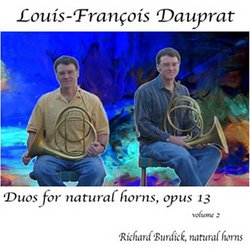| All Artists: Richard Burdick, natural horn Title: Louis-Francois Dauprat s Grand Music for horns, Richard Burdick, natural horn Members Wishing: 1 Total Copies: 0 Label: I Ching Music Release Date: 11/25/2007 Album Type: Single Genre: Classical Style: Chamber Music Number of Discs: 1 SwapaCD Credits: 1 UPCs: 669910679760, 842994006541 |
Search - Richard Burdick, natural horn :: Louis-Francois Dauprat s Grand Music for horns, Richard Burdick, natural horn
 | Richard Burdick, natural horn Louis-Francois Dauprat s Grand Music for horns, Richard Burdick, natural horn Genre: Classical
This release date marks the completion of the recording of all of Dauprat's horn ensemble music by Richard Burdick. With the 2nd volume of Horn Duets opus 13 on CD 18, the Grand Sextets, opus 10 and the Grand Trios opus 4 ... more » |
Larger Image |
CD Details
Synopsis
Product Description
This release date marks the completion of the recording of all of Dauprat's horn ensemble music by Richard Burdick. With the 2nd volume of Horn Duets opus 13 on CD 18, the Grand Sextets, opus 10 and the Grand Trios opus 4 on CD19 and a special release of the Grand Trio opus 26 on a disk for those who buy both CD18 & 19! This special release is only available from i-ching-music.com or Naturalhorn.com Already released are CD16; the Duets opus 14, and CD14; Quartets, opus 8; which is all of the published music for horn ensemble of Dauprat. Why is this important? Louis-François Dauprat was the horn professor at the Paris conservatory in Beethoven's time. He was singly responsible for stalling the development of the Valve horn in France, by as much as 40 years! His compositions are fine early romantic works highly influenced by his teacher Anton Reicha. His writing for natural horn is unbelievably chromatic with keys remote from what would be expected in what normally would be a very limited instrument. His works are outstanding! His Grand sextets are his most popular works partialy due to his use of the High C horn, which resluts in high D for the modern horn or concert G's above the treble clef staff! Performance of his works could only be done by a virtuoso! Great mastery of the natural horn is required to play these works; hear one of today s few natural horn artist. in this amazing recording. Dauprat s intimate knowledge of hand horn techniques makes this opus a compositional tour de force. Not only does he use all twelve notes of the chromatic scale in nearly every piece, he also pioneers the use of key signatures of up to four sharps and four flats for an instrument which was generally restricted to C major. His stated purpose in writing these duos was to write in all the major and minor scales practicable on a single crook. His ideas of what was practicable went far beyond the usual practice of his time, and his goal was at least as much aesthetic as technical. He exploited the positioning of stopped notes to produce distinct moods and tone qualities for each key, much as J.S. Bach did in the Well-Tempered Clavier. For the natural horn, C major and the sharp keys are cheerful and brilliant because they contain many open notes. The sharp notes are often leading tones, so the hand position is more open than would otherwise be the case. Richard plays a horn made by Marcel-Auguste Raoux in the 1840s, modified by Lowell Greer.

 Track Listings (18) - Disc #1
Track Listings (18) - Disc #1